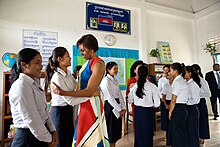
Back تمكين المرأة Arabic নাৰী সবলীকৰণ Assamese नारी सशक्तीकरण Bihari নারী ক্ষমতায়ন Bengali/Bangla Virina aŭtonomigo Esperanto Empoderamiento de la mujer Spanish Emakumeen ahalduntze Basque توانمندسازی زنان Persian Autonomisation des femmes French העצמת נשים HE

| Part of a series on |
| Feminism |
|---|
 |
|
|
Women's empowerment (or female empowerment) may be defined in several method, including accepting women's viewpoints, making an effort to seek them and raising the status of women through education, awareness, literacy, equal status in society, better livelihood and training.[1][2][3] Women's empowerment equips and allows women to make life-determining decisions through the different societal problems.[3] They may have the opportunity to re-define gender roles or other such roles, which allow them more freedom to pursue desired goals.[1]
Women's empowerment has become a significant topic of discussion in development and economics. Economic empowerment allows women to control and benefit from resources, assets, and income. It also aids in the ability to manage risks and improve women's well-being.[4] It can result in approaches to support trivialized genders in a particular political or social context.[5] While often interchangeably used, the more comprehensive concept of gender empowerment concerns people of any gender, stressing the distinction between biological and gender as a role. Women empowerment helps boost women's status through literacy, education, training and awareness creation.[6] Furthermore, women's empowerment refers to women's ability to make strategic life choices that were previously denied them.[7]
Nations, businesses, communities and groups may benefit from implementing programs and policies that adopt the notion of female empowerment.[8] Women's empowerment enhances the quality and the quantity of human resources available for development.[9] Empowerment is one of the main procedural concerns when addressing human rights and development.
Women's empowerment is key to economic and social outcomes. Benefits from projects that empower women are higher than those that just mainstream gender.[10] More than half of bilateral finance for agriculture and rural development already mainstreams gender, but only 6 percent treats gender as fundamental. If half of small-scale producers benefited from development interventions that focused on empowering women, it would significantly raise the incomes of an additional 58 million people and increase the resilience of an additional 235 million people.[10]
According to the Food and Agriculture Organization (FAO), increasing women's empowerment is essential for women's well-being (Women for Women's problems) and has a positive impact on agricultural production, food security, diets and child nutrition.[10]
Several principles define women's empowerment, such as, for one to be empowered, one must come from a position of disempowerment. They must acquire empowerment rather than have it given to them by an external party. Other studies have found that empowerment definitions entail people having the capability to make important decisions in their lives while also being able to act on them. Empowerment and disempowerment are relative to each other at a previous time; empowerment is a process rather than a product.[2]
Scholars have identified two forms of empowerment: economic empowerment and political empowerment.[11][12]
- ^ a b Kabeer, Naila. "Gender equality and women'empoverment: A critical analysis o the third millennium development goal 1." Gender & Development 13.1 (2005): 13–24.
- ^ a b Mosedale, Sarah (March 1, 2005). "Assessing women's empowerment: towards a conceptual framework". Journal of International Development. 17 (2): 243–257. doi:10.1002/jid.1212. ISSN 1099-1328.
- ^ a b Bayeh, Endalcachew (January 2016). "The role of empowering women and achieving gender equality to the sustainable development of Ethiopia". Pacific Science Review B: Humanities and Social Sciences. 2 (1): 38. doi:10.1016/j.psrb.2016.09.013.
- ^ Oxfam (Forthcoming), "Women's Economic Empowerment Conceptual Framework"
- ^ Baden, Sally; Goet, Anne Marie (July 1997). "Who Needs [Sex] When You Can Have [Gender]? Conflicting Discourses on Gender at Beijing". Feminist Review. 56 (1): 3–25. doi:10.1057/fr.1997.13. ISSN 0141-7789. S2CID 143326556.
- ^ Lopez, Alvarez (2013). "From unheard screams to powerful voices: a case study of Women's political empowerment in the Philippines". 12th National Convention on Statistics (NCS) EDSA Shangri-la Hotel, Mandaluyong City October 1–2, 2013.
- ^ "Innovation for women's empowerment and gender equality". ICRW | PASSION . PROOF. POWER. Archived from the original on May 20, 2021. Retrieved May 20, 2021.
- ^ Deneulin, Séverine; Lila Shahani, eds. (2009). "An Introduction to the Human Development and Capability Approach: Freedom and Agency" (PDF). Sterling, VA: Earthscan. Archived (PDF) from the original on June 16, 2016. Retrieved September 1, 2016.
- ^ Gupta, Kamla; Yesudian, P. Princy (2006). "Evidence of women's empowerment in India: a study of socio-spatial disparities". GeoJournal. 65 (4): 365–380. doi:10.1007/s10708-006-7556-z. S2CID 128461359.
- ^ a b c The status of women in agrifood systems - Overview. Rome: FAO. 2023. doi:10.4060/cc5060en. S2CID 258145984.
- ^ Kabeer, Naila. "Contextualising the Economic Pathways of Women's Empowerment: Findings from a Multi-Country Research Programme." (2011).
- ^ United Nations Development Programme; Stephanie Chaban; Luis J. Consuegra; Hannah Elten; Karin Gardes; Olivia Greymond; Olga Martin Gonzalez; Mona Lena Krook; Liri Kopaci-Di Michele; Hien Thi Nguyen; Nika Saeedi; Safi Trabelsi; Catherine Woollard (2017). Regional organizations, gender equality and the political empowerment of women. Stockholm: International IDEA. ISBN 978-91-7671-140-8. Archived from the original on April 13, 2018. Retrieved April 8, 2018.
{{cite book}}: CS1 maint: multiple names: authors list (link)